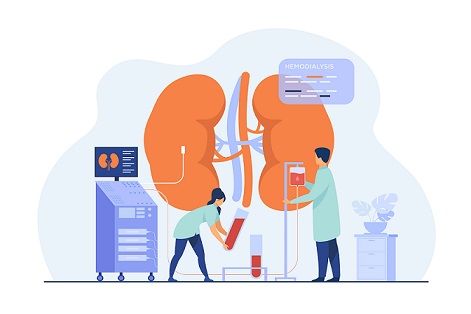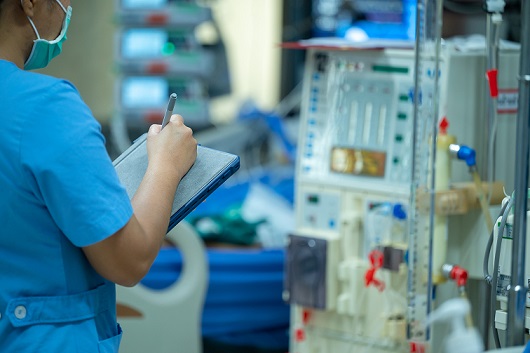Kidney Care
Understanding Diabetic Kidney Care

More than 40% of kidney disease in our country occurs due to diabetes. If detected at an early stage, this complication can be reversed!
Dr. Mohan’s Diabetes Specialities Centre has facilities to estimate the early and late markers of kidney disease and detect diabetic nephropathy. Testing for ‘microalbuminuria’ every 3-6 months ensures that one’s kidneys are in order and have not been affected by diabetes. There are many other specialised kidney tests to further evaluate the status of the kidneys.
Patients can avail a nephrologist’s consultation with prior appointment.
Treatments and Infrastructure
Dialysis unit
Dialysis is a procedure to substitute the normal functions of the kidney of patients with renal failure. Dialysis helps individuals to live productive and useful lives, even though their kidneys are not functioning normally.
A dialysis unit is available to take care of patients who require the procedure. Our dialysis unit is best-equipped with facilities to manage patients with diabetes on regular hemodialysis. Dialysis unit ensures quality care from a highly trained clinical team of nephrologists, diabetologists, nutritionist and dialysis technicians.

Frequently Asked Questions
Simply said, dialysis is a method of purifying your blood. It is a medical therapy for persons with ESRD that performs some of the functions of healthy kidneys, such as:
- Getting rid of trash, salt, and excess water in your body
- Keeping your body’s fluid balance in check
- Assisting with the regulation of your blood pressure
Chronic kidney disease (CKD) is a term used to describe kidney damage or diminished kidney function that lasts for more than three months, regardless of the aetiology. CKD may sometimes develop to kidney failure or end-stage renal disease (ESRD), which requires dialysis or a kidney transplant to keep you alive.
It is critical that dialysis patients limit their consumption of the mineral potassium. In between dialysis treatments, potassium levels in the blood may build up and become excessive, affecting your pulse. Hyperkalemia (excess potassium in the blood) may induce nausea, weakness, weariness, irregular pulse, and potentially cardiac arrest and death.
Within two to five years of being diagnosed with Type I diabetes, almost all patients show some signs of functional alteration in the kidneys. Approximately 30 to 40% proceed to more significant renal disease, generally within 10 to 30 years.
Type II diabetes (adult-onset or non-insulin-dependent) diabetes has a less well-defined history, but it is thought to follow a similar pattern, except that it begins at a later age.
Keep your blood pressure under control to protect your kidneys. Blood pressure medications may also help delay kidney damage. ACE inhibitors and ARBs, two kinds of blood pressure medications, play a specific function in kidney protection.
Yes, diabetes can cause kidney related diseases. Here’s how:
The kidney’s primary role is to cleanse the blood. High blood sugar levels in diabetics may severely damage blood vessels throughout the body, including those in the kidney. If they are injured, waste and fluids accumulate in your blood rather of leaving your body.
Filtering too much blood (due to high blood sugar) limits the kidney’s filtering function, causing valuable protein to be lost in the urine. This condition is known as microalbuminuria, and it may be followed by renal disease.
Diabetes may also harm the nerves in the human body, making it difficult to empty the bladder, which can ultimately harm the kidneys.
Diabetes may be the primary cause of high blood pressure in the human body, compressing the blood vessels in the kidney, resulting in excess fluids and higher blood pressure, causing a vicious cycle.
Diabetes may harm your kidneys over time, and when diabetes is the major cause of kidney disease, it is referred to as Diabetic Kidney Disease, or Diabetic Nephropathy.
